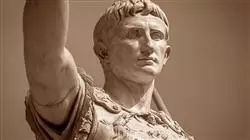University certificate
The world's largest faculty of humanities”
Introduction to the Program
With this educational program, you will obtain all the tools of thought and analysis that are required in the field of philosophical anthropology. Enroll now”

In the digital world, philosophy seems to blur and overlap without allowing its relation to different scientific and humanistic knowledge to emerge. Nevertheless, large technology companies such as Microsoft, IBM or Google have incorporated philosophers into their staff in order to respond to potential ethical problems, for example, regarding Artificial Intelligence. At the same time, global political turmoil also requires reflections given by sociologists who are very familiar with the main philosophers, the concept of State, social constitution, justice or peace.
This new working reality is the underlying justification for this program. Understanding the world, the close connection between philosophy and the media and social reality; or posing the main human problems and their implications in everyday life are some of the points that this Professional master’s degree in Ethics, Philosophy, Politics and Anthropology delves into. It provides advanced and extensive knowledge, which is presented in a dynamic way thanks to the innovative teaching material developed by TECH and the use of the latest technology applied to academic teaching.
A program that will enable students to advance professionally in different fields after delving into the philosophy of law and political philosophy, from the classics to Rousseau, and cultural philosophy itself. All this taking a theoretical and practical approach, thanks to the case studies provided by the specialized team that teaches this program.
A 100% online Professional master’s degree that gives students the opportunity to study it comfortably, whenever and wherever they choose. Students only need an electronic device to access the syllabus on the virtual campus. The content is available at any time of day, allowing students to organize the course load around their daily commitments. Students are offered this flexible program which allows them to balance quality education with the most demanding responsibilities.
Thanks to this Professional master’s degree, you will approach philosophical thought, society and politics from a theoretical and practical perspective”
This Professional master’s degree in Ethics, Philosophy, Politics and Anthropology contains the most complete and up-to-date program on the market. The most important features include:
- Practical cases presented by experts in Philosophy and Anthropology
- The graphic, schematic, and practical contents with which they are created, provide scientific and practical information on the disciplines that are essential for professional practice
- Practical exercises where self-assessment can be used to improve learning
- Special emphasis on innovative methodologies in Philosophy and Anthropology
- Theoretical lessons, questions to the expert, debate forums on controversial topics, and individual reflection assignments
- Content that is accessible from any fixed or portable device with an Internet connection
Enroll in an online program designed so you can balance quality education with your personal responsibilities”
The program’s teaching staff includes professionals from the sector who contribute their work experience to this program, as well as renowned specialists from leading societies and prestigious universities.
The multimedia content, developed with the latest educational technology, will provide the professional with situated and contextual learning, i.e., a simulated environment that will provide immersive specialization programmed to learn in real situations.
This program is designed around Problem-Based Learning, whereby the professional must try to solve the different professional practice situations that arise throughout the program. For this purpose, the student will be assisted by an innovative interactive video system created by renowned and experienced experts.
Acquire the theoretical bases and practical tools required for the most complete philosophical analysis"

Know the philosophical bases of the most relevant human developments and acquire the ability to elaborate and present a complete analysis of their current situation"
Why study at TECH?
TECH is the world’s largest online university. With an impressive catalog of more than 14,000 university programs available in 11 languages, it is positioned as a leader in employability, with a 99% job placement rate. In addition, it relies on an enormous faculty of more than 6,000 professors of the highest international renown.

Study at the world's largest online university and guarantee your professional success. The future starts at TECH”
The world’s best online university according to FORBES
The prestigious Forbes magazine, specialized in business and finance, has highlighted TECH as “the world's best online university” This is what they have recently stated in an article in their digital edition in which they echo the success story of this institution, “thanks to the academic offer it provides, the selection of its teaching staff, and an innovative learning method aimed at educating the professionals of the future”
A revolutionary study method, a cutting-edge faculty and a practical focus: the key to TECH's success.
The most complete study plans on the university scene
TECH offers the most complete study plans on the university scene, with syllabuses that cover fundamental concepts and, at the same time, the main scientific advances in their specific scientific areas. In addition, these programs are continuously being updated to guarantee students the academic vanguard and the most in-demand professional skills. In this way, the university's qualifications provide its graduates with a significant advantage to propel their careers to success.
TECH offers the most comprehensive and intensive study plans on the current university scene.
A world-class teaching staff
TECH's teaching staff is made up of more than 6,000 professors with the highest international recognition. Professors, researchers and top executives of multinational companies, including Isaiah Covington, performance coach of the Boston Celtics; Magda Romanska, principal investigator at Harvard MetaLAB; Ignacio Wistumba, chairman of the department of translational molecular pathology at MD Anderson Cancer Center; and D.W. Pine, creative director of TIME magazine, among others.
Internationally renowned experts, specialized in different branches of Health, Technology, Communication and Business, form part of the TECH faculty.
A unique learning method
TECH is the first university to use Relearning in all its programs. It is the best online learning methodology, accredited with international teaching quality certifications, provided by prestigious educational agencies. In addition, this disruptive educational model is complemented with the “Case Method”, thereby setting up a unique online teaching strategy. Innovative teaching resources are also implemented, including detailed videos, infographics and interactive summaries.
TECH combines Relearning and the Case Method in all its university programs to guarantee excellent theoretical and practical learning, studying whenever and wherever you want.
The world's largest online university
TECH is the world’s largest online university. We are the largest educational institution, with the best and widest online educational catalog, one hundred percent online and covering the vast majority of areas of knowledge. We offer a large selection of our own degrees and accredited online undergraduate and postgraduate degrees. In total, more than 14,000 university degrees, in eleven different languages, make us the largest educational largest in the world.
TECH has the world's most extensive catalog of academic and official programs, available in more than 11 languages.
Google Premier Partner
The American technology giant has awarded TECH the Google Google Premier Partner badge. This award, which is only available to 3% of the world's companies, highlights the efficient, flexible and tailored experience that this university provides to students. The recognition as a Google Premier Partner not only accredits the maximum rigor, performance and investment in TECH's digital infrastructures, but also places this university as one of the world's leading technology companies.
Google has positioned TECH in the top 3% of the world's most important technology companies by awarding it its Google Premier Partner badge.
The official online university of the NBA
TECH is the official online university of the NBA. Thanks to our agreement with the biggest league in basketball, we offer our students exclusive university programs, as well as a wide variety of educational resources focused on the business of the league and other areas of the sports industry. Each program is made up of a uniquely designed syllabus and features exceptional guest hosts: professionals with a distinguished sports background who will offer their expertise on the most relevant topics.
TECH has been selected by the NBA, the world's top basketball league, as its official online university.
The top-rated university by its students
Students have positioned TECH as the world's top-rated university on the main review websites, with a highest rating of 4.9 out of 5, obtained from more than 1,000 reviews. These results consolidate TECH as the benchmark university institution at an international level, reflecting the excellence and positive impact of its educational model.” reflecting the excellence and positive impact of its educational model.”
TECH is the world’s top-rated university by its students.
Leaders in employability
TECH has managed to become the leading university in employability. 99% of its students obtain jobs in the academic field they have studied, within one year of completing any of the university's programs. A similar number achieve immediate career enhancement. All this thanks to a study methodology that bases its effectiveness on the acquisition of practical skills, which are absolutely necessary for professional development.
99% of TECH graduates find a job within a year of completing their studies.
Professional Master's Degree in Ethics, Philosophy, Politics and Anthropology
Today's society has gone through several changes in economic and technological matters, as well as cultural and diplomatic, this has allowed humanity to develop its free thinking through various ideologies; without leaving aside the ethical action, linked to history and government agencies. Nevertheless, these areas continue to be fundamental in the research of professionals dedicated to the study of these areas, since they obtain an argumentative vision of the sociological or educational environment in which they work. Being predominant topics that require specific academic material, TECH developed a Professional Master's Degree in Ethics, Philosophy, Politics and Anthropology that reasonably addresses the human aspects in which their morality is developed. The contents of this online postgraduate course will be taught by a team of high-level teachers, who will complement this training with multimedia material and theoretical-practical lessons. Students will delve into the ideological science used to understand personal activity and thought, as well as the exploration of bioethical and behavioral problems.
Specialize in addressing moral, philosophical, diplomatic and anthropological aspects.
If you wish to acquire new knowledge in completely new areas, this Postgraduate Certificate brings together the elements required to specialize in the area. Thanks to this intensive training, supported by the relearning methodology, you will obtain an analytical thinking that will allow you to develop in the branches of this subject. Through this 12-month program, you will learn everything related to the humanistic environment, which includes metaphysics, philosophical anthropology (theology), the generalities of bioethics as a discipline and the areas of law that make up the order of thought and the capacity for dialogue. You will also delve into the constitutive foundations of human morality, which allows you to make ethical and value judgments about the objective order of different actions in personal and social life. Finally, you will learn from the main political theories and their institutions, to the origin of the anthropological notion and its conception spread in cultural expressions. Therefore, you will be able to analyze, debate or reflect on situations involving different aspects of human integrity and ideology, through an interdisciplinary approach.







